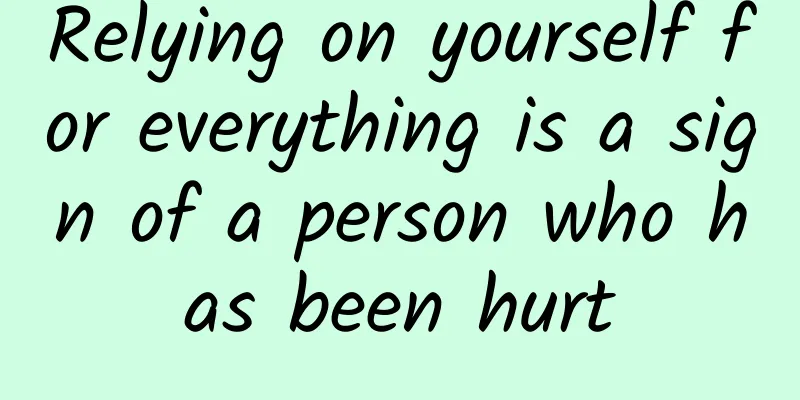Relying on yourself for everything is a sign of a person who has been hurt

|
From childhood to adulthood, I believe many people have heard these words: "You can only rely on yourself for everything, don't rely on anyone else." "If you rely on mountains, they will fall; if you rely on people, they will run away. You can't rely on anyone." "When you encounter difficulties, you can only solve them by yourself. Don't ask for help, so as not to cause trouble to others." … Therefore, many people have learned at a young age not to bother others, not to be a burden, and not to owe favors to others. We have learned to hide our needs and vulnerabilities, and to keep ourselves as "independent" and "self-reliant" as possible. We are afraid of causing trouble to others, afraid of being seen as weak, and even afraid of being rejected. Whenever I long for support and help, there is always a voice warning me: "Don't bother others, this is all your business." We seem to be "self-reliant" on the surface, but in our hearts we are often shrouded in helplessness, loneliness and exhaustion. How we wish someone could lend a hand when we are vulnerable and helpless; how we long for the gentle comfort of "I'll help you". But these three simple words "help me" seem to be stuck in our throats, unable to be spoken or swallowed. Copyright images in the gallery. Reprinting and using them may lead to copyright disputes. Rely on yourself for everything It could be a sign of someone being injured. As the saying goes, "The crying child gets the milk, and the child who calls for his mother gets the love". Children are born knowing how to seek help, how to express their needs through crying, and how to convey their dependence by "calling for their mother". But since when did we learn not to cry, make a fuss, or shout or ask for help, and keep everything in our hearts? Was it when we cried for the first time and were scolded for "crying for such a small matter", or when we heard the words "you should be sensible when you grow up", or when we found that relying on others would only result in the evaluation of "you are such a trouble"? Gradually, we learned to rely on ourselves for everything, becoming overly sensible and overly independent, but we didn’t realize that excessive silence and forbearance would only make us “transparent”. This negative vortex of “hurt - no one cares - bear it yourself - more hurt”, while trying to protect ourselves, traps ourselves in an abyss of isolation and helplessness. Relying on yourself may be a side effect of role reversal What does it mean to be sensible? In the eyes of most adults, it means not causing trouble, not bringing burdens, not worrying others, knowing how to take care of oneself, and solving problems by oneself. At an age when children should be throwing tantrums and rolling about, they have learned to endure grievances; at a time when they should be pampered and coddled, they have to provide emotional value for adults and become the emotional "container" of adults, containing their fatigue, stress and anxiety. This phenomenon of children and parents' roles being reversed and parents imposing their own unmet emotional, physical or psychological needs on their children is called "parentification." In short, children take on the responsibilities of their parents, play the role of their parents, and are parentified. If children who become head of household early due to poverty experience instrumental parenting by taking on housework and taking care of siblings, then children who mature emotionally too early and take on the responsibility of comforting adults and mediating family conflicts experience emotional parenting. They sacrifice their innocence and dependence and support the emotional balance of the family in a way that goes beyond their age. According to Resilience Theory, moderate instrumental parenting, that is, taking on some family care responsibilities that do not exceed the child's developmental capacity and being recognized and appreciated by the parents, may produce positive growth results, such as becoming more mature and more responsible. However, a large number of research results also reveal that in the process of children being instrumentally parented, negative and positive effects coexist, such as causing problems in children's emotional management. It is worth noting that emotional parenting and instrumental parenting are not mutually exclusive, and they may be intertwined at different levels. Children who are instrumentally parented will also be emotionally parented to a certain extent, that is, they have to take on the responsibility of taking care of family practical matters and the work of soothing their parents' emotions. Studies have found that emotional parenting is more harmful and destructive than instrumental parenting. It is a kind of childhood trauma and a key factor leading to children's extreme independence. It deprives children of the carefree childhood they deserve and makes them face the pressure of life prematurely. This extreme independence is not true maturity, but a self-protection mechanism that children are forced to develop in the absence of proper support and care. Therefore, when children who are parentified grow up, they often show the following behavioral and psychological characteristics: Over-independence: unwilling to rely on others or afraid to ask for help from others; Emotional repression: habitually suppressing one's own emotional needs and being easily confused or overwhelmed when dealing with one's own and others' emotions; Strong sense of responsibility: often still feel the need to take responsibility for family or other people, and may even be overly devoted to taking care of others and neglect their own needs; Low sense of self-worth: They may associate their self-worth with “taking care of others” or “taking responsibility” and often feel that they are not worthy of being loved and cared for; Relationship avoidance: They may be afraid of becoming overly dependent on others and worry about becoming a "container" of other people's emotions again, so they feel uneasy or avoid establishing close relationships; Emotional problems: You may feel extremely anxious when facing stress, or rely too much on rational thinking to suppress your emotional fluctuations. Relying on yourself alone may be because you have suffered enough from not knowing how to say no. People who don't know how to ask for help often don't know how to refuse, because both asking for help and refusing involve the establishment and maintenance of boundaries: asking for help requires clearly expressing one's needs and acknowledging that one cannot solve the problem independently; refusing requires setting personal boundaries and defending one's time, energy, and emotional resources. If a person lacks boundary awareness or is not good at setting boundaries, they may neither express their needs (not knowing how to ask for help) nor effectively protect their resources (not knowing how to refuse). Giving roses to others leaves a sweet fragrance on your hands. When you help others, you can also gain satisfaction and growth. However, when this kind of help does not come from the true will of the heart, but out of helplessness or pressure, the original warmth and sense of accomplishment will disappear, and be replaced by depression, grievance, and anger. However, saying “no” is not easy and comes at a cost. Saying no to others may cause strain in interpersonal relationships, and even lead to conflict or alienation. Many people often go against their true will to cater to others because they are afraid of being misunderstood, not accepted, or being labeled as “cold” or “unkind”. In addition, saying no to others may also trigger internal emotional conflicts. For most people, saying no means a psychological cost - they may feel guilty or even ashamed, thinking that they have failed to fulfill their responsibility to “be helpful”. Being stuck in the dilemma of "being forced to help" and "refusing to help" not only consumes experience, but may also lead to emotional exhaustion and relationship tension. Having suffered enough from "not knowing how to say no", many people will instead strengthen their belief of "not bothering others". Since they feel wronged and depressed because they cannot say no, they try to avoid letting others experience similar feelings, internalizing "not bothering others" as a conscious code of conduct, and even elevating it to a philosophy of life. They would rather bear everything alone than let others worry and work hard for their needs. Behind this belief is often a profound experience of imbalance in interpersonal relationships and a deep-rooted sense of unease about "causing trouble to others". Relying on yourself alone may be the pain after experiencing all the ups and downs What makes us lose the natural ability to "ask for help"? It may be the disappointment of calling out again and again but not getting a response; it may be the embarrassment of being coldly rejected when trying to rely on others; it may also be that when we muster up the courage to seek support, we are met with accusations instead of comfort. Over time, we have learned to be silent, hiding all the pain in our hearts and digesting it alone. The "learned helplessness" theory proposed by psychologist Martin Seligman reveals this process: when people try to ask for help many times in difficult situations but get no response, they may feel that their efforts are in vain, and even begin to think "I don't deserve to be helped" or "others won't help me at all". Over time, this idea will be deeply rooted in the heart and become a belief: the world is dangerous, others are indifferent, and only by relying on oneself can we solve problems. Because of this, we begin to stay away from asking for help and choose to face everything alone. The injured person hurts others as well as himself. A wounded person is like a trapped animal that will show its fangs. Although it is for self-protection, it also makes itself struggle blindly in pain, and inadvertently hurts those around it who try to get close to help. Relying on yourself for everything and refusing to ask for help is actually refusing to connect with others and building an invisible wall. You are you, I am me, I don't owe you, you don't owe me, we have nothing to do with each other. When you are lost, you would rather spend a lot of time figuring out the way by yourself than be embarrassed to ask passers-by how to get to the nearest subway station; when you encounter difficulties at work, you would rather stay up late and work overtime alone to think hard than ask colleagues for help, for fear of adding to their burden; when moving, even if there are heavy objects, you insist on carrying them one by one by yourself, and are unwilling to ask friends for help, for fear of causing trouble to others; even if it is your closest partner, when the other person wants to share your sorrow, you always shake your head and refuse, fearing that your vulnerability will become a burden to the other person, but you don’t know that such alienation is quietly eroding the intimacy and trust between the two of you, making the relationship become distant and indifferent. People who rely on themselves for everything underestimate the sincerity of others to help them, deprive others of the opportunity to get close to them, and miss the beauty of growing together with others and supporting each other. Social support theory emphasizes that supportive interpersonal relationships are essential to mental health. When people encounter stress or difficulties, if they can rely on others and seek social support, it will greatly reduce their psychological burden and increase their psychological resilience. Refusing to connect with others and relying too much on oneself will actually prevent the acquisition of such social support, leading to psychological isolation and a backlog of negative emotions. In addition, psychological research has also found that helping others is not only beneficial to those in need, but the person providing the help will also feel satisfied and valuable. This is the "warmth effect" contained in prosocial behavior. In fact, asking for something and getting a response may be more common than people think. A cross-cultural study found that in daily life, 88% of people's requests were met. So it's time to break down the mental wall of "doing it yourself" and learn to actively seek help from others. We are not alone, and we don't have to fight alone, because in this warm society, there are always people willing to lend a hand and fight side by side. Conclusion True independence comes from inner maturity, not from building high walls to avoid harm; true independence is the ability to make decisions, not to bear all responsibilities alone; true independence does not require us to carry everything on our own, but to learn to rely on others in a relationship of trust, to understand and accept that interdependence between people is part of human nature; true independence is to find a balance between independence and dependence, to be able to face the challenges of life alone, and to find strength in the care of others. References [1] Heidi Grant. (2021). How to ask for help correctly: Acquiring resources and connections in a reasonable way. Democracy and Construction Press. ISBN: 9787513936804 Hyper-Independence: Is It a Trauma Response? | Psychology Today Illusions of Independence | Psychology Today Frontiers | The Relations Among Types of Parentification, School Achievement, and Quality of Life in Early Adolescence: An Exploratory Study Haxhe, S. (2016). Parentification and related processes: Distinction and implications for clinical practice. Journal of Family Psychotherapy, 27(3), 185-199. Planning and production Author: Su Jing, National Level 2 Psychological Counselor Reviewer: Zhang Xin, Associate Professor, School of Psychology and Cognitive Science, Peking University Planning丨Zhong Yanping Editor: Zhong Yanping Proofread by Xu Lailinlin |
<<: How to keep the oil flowing? Build a "highway" for the oil to flow!
Recommend
Sad! A scientist passed away, and his final work deployment was moving
Zhao Jingzhu A scientist August 4, 2021 He passed...
How did these cultural relics survive the centuries of wind and rain and multiple earthquakes and still stand?
Over the long years, the ancient buildings on the...
Tips and strategies for becoming a “super user”!
The free feast on the Internet is becoming a thin...
The road to Shu is harder than ascending to heaven: Which road exactly is the road to Shu?
The road to Shu is as difficult as ascending to h...
Snowball Irish Thrush Stock Trading Training 2021 Course Video
Snowball Irish Thrush Stock Trading Training 2021...
World Asthma Day | Asthma is not a trivial matter, don’t let negligence cost you your life!
"No matter how time flies by, I only care ab...
New energy vehicle rural promotion campaign launched, ten companies offer discounts to third-tier and fourth-tier cities and below, with the highest discount of 8,000 yuan
On July 15, 2020, the Ministry of Industry and In...
Qiqihar Railway University (How many points are there for Qiqihar Railway University)
There is no Railway University in Qiqihar. Even i...
An introduction to 360 Fengwu industry direct advertising promotion product styles!
In order to better promote for you, Fengwu Advanc...
Lenovo and Hisense are pressing LeTV, and the smart TV war is heating up
The fierce competition in the smart TV market has...
How fast is the fastest backflip? 368 turns in one second! | Natural Trumpet
Welcome to the 65th issue of the Nature Trumpet c...
The future of Android - PC-based
In August this year, Xiaomi released MIUI 7 with ...
QQ Simple Edition, Tencent TIM PC Edition 3.3.5 beta version download: Netdisk supports backup of chat records
IT Home reported on February 7 that recently, Ten...
Case sharing: How to use red envelope fission promotion to increase APP downloads?
The gameplay of the expanding red envelope is ver...
3 points of analysis on community operation
Community is a concept that is familiar to all fr...









